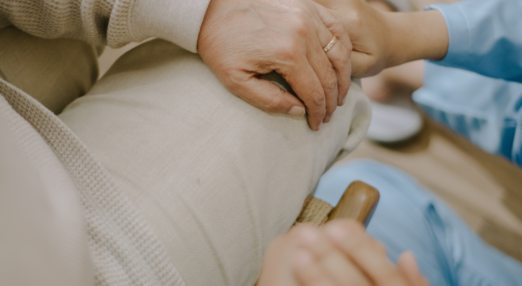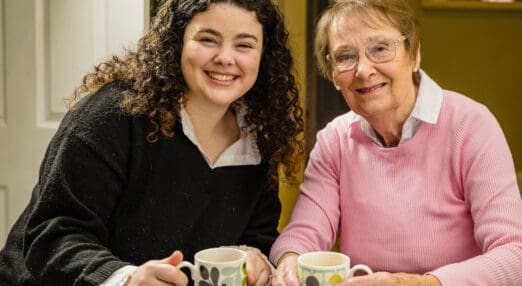Lending a helping pair of hands
When Sue (from Berkhamsted) spotted an appeal for Supporting Hands volunteers in her local community magazine it came just at the right time for the former nurse who was, in her own words, looking for ways ‘to be useful again’. Despite some reservations about how the commitment would fit in with her life, Sue signed up as a volunteer and hasn’t looked back. After supporting nine local people, Sue is sharing her experience to encourage others to consider becoming Supporting Hands volunteers. She explains:
“I worked as a nurse for many years and in my retirement I really missed it. While visiting a cousin who was being cared for in a hospice, I really realised how much I missed nursing and wanted to do something that involved working with people and being useful to them.
“Around the same time, I saw an advert in a community magazine appealing for Supporting Hands volunteers so I got in touch straight away. I did have some concerns such as whether I would have to commit to every single week and if it would get in the way of my ambitions to travel in my retirement. The team assured me this wasn’t the case and with notice, we can be flexible about visits to make sure I can still travel as I want to.
“Since I started volunteering I have supported people ranging in age from 45 to 99. I love working with people and this role has really brought me into contact with some wonderful people. It’s a privilege for someone to welcome me into their home and talk to me about their life.
Making a difference to patients and their families
“Some of the people I support ask for practical help with tasks at home. That might be taking out their recycling if they live in a block of flats and have reduced mobility or tackling a pile of ironing. But in all cases the role is about providing companionship. Whether we’re chatting over the ironing board or sharing stories while leafing through family photo albums, this role allows me to spend time with people and really listen to what they have to say.
“So many of the people I’ve supported have been very lonely. They might have no family nearby and in some cases I will be the only person they see that week. It’s an honour to be the person who visits just to see them – to chat about how they’re doing and to give them some company to break up the day or week.
“Some of the patients I support live with their loved ones but still value the chance to talk to somebody outside their family. In this case it often makes a huge difference to their loved ones who have the chance for some respite while they know their relative is in safe hands. This might be the only opportunity they have in a week to go out by themselves, either to run errands or to do something that’s just for them, so this is a hugely important part of the service.
“A lot of the people I have supported over the years have been approaching the end of their life. Friends sometimes ask me how I find that, and whether you need to be a trained nurse to deal with it. I certainly find my nursing background helpful in this role but it’s really not necessary. If you have compassion and the ability to listen, you would be great in this role.
“Rennie Grove Peace also offers fantastic support for volunteers. The team has always made clear to me that if I struggle at all with the role or need somebody to talk to, there is always a professional able to support me. It isn’t something I have felt the need to access yet, but it’s reassuring to know that help is available.
“The people that I volunteer with are all patients of Rennie Grove Peace. I sometimes support people in a period when they’ve been discharged from Hospice at Home care as their condition is stable. As a volunteer I can be a point of contact between the patient and the charity in this time when they don’t need nursing care but still require support.
“I do one patient visit each week so it takes up a couple of hours each week. It isn’t a huge time commitment so it fits in well with other things that I do. I also know that it’s flexible on both sides – if the patient needs to postpone for any reason we work to find an alternative day and if I’m planning to be away, I can just let them know in advance that I won’t be available on a certain day.
“I sometimes feel like I haven’t done much – just gone in for a cuppa and a chat – but the feedback from patients who have received this support shows that it does make a huge difference in their lives.”
You may also be interested in
-

Volunteer in the community
With Rennie Grove Peace Hospice Care's one-off and ongoing volunteering roles in your local community
Read more
-

Volunteer enquiry form
Please fill in our volunteer enquiry form. A member of our volunteering team will be in touch shortly.
Read more
-

Volunteer stories
Hear from some of our amazing Rennie Grove Peace volunteers
Read more




